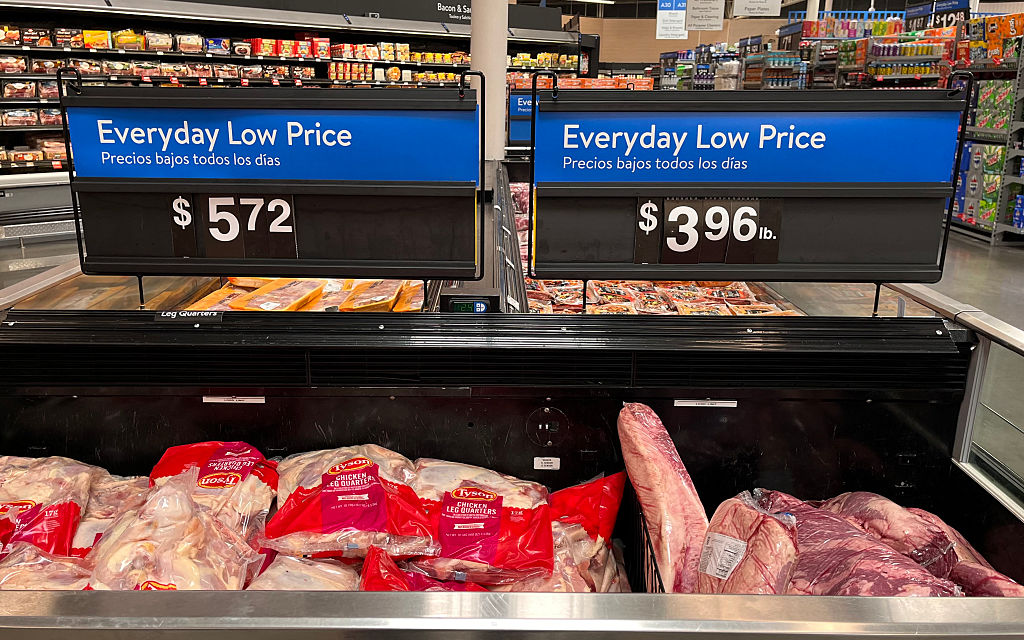Walmart Raising Prices Soon — Here’s Which Products Will Cost You More This Summer
If you heard about Walmart raising prices, here are the key details you need to know ahead of your next shopping trip.

Profit and prosper with the best of Kiplinger's advice on investing, taxes, retirement, personal finance and much more. Delivered daily. Enter your email in the box and click Sign Me Up.
You are now subscribed
Your newsletter sign-up was successful
Want to add more newsletters?

Delivered daily
Kiplinger Today
Profit and prosper with the best of Kiplinger's advice on investing, taxes, retirement, personal finance and much more delivered daily. Smart money moves start here.

Sent five days a week
Kiplinger A Step Ahead
Get practical help to make better financial decisions in your everyday life, from spending to savings on top deals.

Delivered daily
Kiplinger Closing Bell
Get today's biggest financial and investing headlines delivered to your inbox every day the U.S. stock market is open.

Sent twice a week
Kiplinger Adviser Intel
Financial pros across the country share best practices and fresh tactics to preserve and grow your wealth.

Delivered weekly
Kiplinger Tax Tips
Trim your federal and state tax bills with practical tax-planning and tax-cutting strategies.

Sent twice a week
Kiplinger Retirement Tips
Your twice-a-week guide to planning and enjoying a financially secure and richly rewarding retirement

Sent bimonthly.
Kiplinger Adviser Angle
Insights for advisers, wealth managers and other financial professionals.

Sent twice a week
Kiplinger Investing Weekly
Your twice-a-week roundup of promising stocks, funds, companies and industries you should consider, ones you should avoid, and why.

Sent weekly for six weeks
Kiplinger Invest for Retirement
Your step-by-step six-part series on how to invest for retirement, from devising a successful strategy to exactly which investments to choose.
In its quarterly earnings call on Thursday, Walmart announced that the major retailer would be raising prices at its stores due to the high tariffs on imports.
During the call, the Senior Vice President of Walmart, Stephanie Schiller Wissink told investors, “Given the magnitude of the tariffs, even at the reduced levels announced this week, we aren't able to absorb all the pressure.”
Following the announcement, President Trump criticized Walmart's decision in a Truth Social post, suggesting the retailer "eat the tariffs" rather than hike prices for customers.
From just $107.88 $24.99 for Kiplinger Personal Finance
Become a smarter, better informed investor. Subscribe from just $107.88 $24.99, plus get up to 4 Special Issues

Sign up for Kiplinger’s Free Newsletters
Profit and prosper with the best of expert advice on investing, taxes, retirement, personal finance and more - straight to your e-mail.
Profit and prosper with the best of expert advice - straight to your e-mail.
While Wissink already discussed Walmart's plans to absorb some of the added costs of tariffs during the Thursday call with investors, she noted that the company would have to pass on some of the price hikes to customers.
Starting as soon as late May and especially in June, prices at Walmart locations nationwide and online are going up – but just how much of a price hike you can expect is still unclear. Here’s what we know so far about the major retailer’s plans.
Why is Walmart raising prices?

The recent tariffs that have been rolling out over the last few months have been hitting businesses everywhere. Everything from cars to baby items have been getting more expensive due to tariffs.
However, until now, Walmart has been somewhat shielded from the impact of the trade war because a big chunk of its products are from the United States.
“More than two-thirds of what we sell in the U.S. is made, assembled, or grown here,” Wissink said. But not everything Walmart sells is made here and, in certain cases, there are no U.S. suppliers that could replace Walmart’s overseas suppliers. So some products on store shelves will be more expensive.
The retailer didn’t say exactly how much higher prices would be, but the Senior Vice President repeatedly emphasized that Walmart was in a position to absorb some of the costs in order to keep prices for shoppers as low as possible.
Part of that ability to absorb the cost is due to the success its seen in other areas of its business. During the earnings call on Thursday, the major retailer reported a big uptick in Walmart Plus memberships, noting a nearly 15% increase in membership income over the first quarter.
That and other sources of growth have helped put the company in a position to stave off price increases, as everyday low prices have historically been one of its key draws for consumers.
Sign up for a free 30-day trial of Walmart Plus to get free shipping, exclusive deals, free Paramount Plus and other cool perks. After the trial, membership renews at $12.95/month or $98/year.
Walmart raising prices – but not on food
One way Walmart plans to limit the impact of tariff price hikes on its shoppers is by keeping food prices as low as possible. “We won't let tariff-related cost pressure on some general merchandise items put pressure on food prices,” Wissink said.
While certain imported foods that aren’t typically grown in the United States – like bananas, coffee and avocados – might get more expensive, Walmart plans to keep other food prices as low as possible. Instead, shoppers are most likely to feel the impact when shopping for electronics and toys, which, the retailer noted, are largely imported from China.
This is true across other retailers, too. One of Walmart’s biggest rivals, Amazon briefly considered displaying tariff charges on its product pages last month. Over 70% of products on the online marketplace come from Chinese suppliers, making the ecommerce giant even more vulnerable to tariffs than Walmart.
Related content
Profit and prosper with the best of Kiplinger's advice on investing, taxes, retirement, personal finance and much more. Delivered daily. Enter your email in the box and click Sign Me Up.

Rachael Green is a personal finance eCommerce writer specializing in insurance, travel, and credit cards. Before joining Kiplinger in 2025, she wrote blogs and whitepapers for financial advisors and reported on everything from the latest business news and investing trends to the best shopping deals. Her bylines have appeared in Benzinga, CBS News, Travel + Leisure, Bustle, and numerous other publications. A former digital nomad, Rachael lived in Lund, Vienna, and New York before settling down in Atlanta. She’s eager to share her tips for finding the best travel deals and navigating the logistics of managing money while living abroad. When she’s not researching the latest insurance trends or sharing the best credit card reward hacks, Rachael can be found traveling or working in her garden.
-
 Quiz: Do You Know How to Avoid the "Medigap Trap?"
Quiz: Do You Know How to Avoid the "Medigap Trap?"Quiz Test your basic knowledge of the "Medigap Trap" in our quick quiz.
-
 5 Top Tax-Efficient Mutual Funds for Smarter Investing
5 Top Tax-Efficient Mutual Funds for Smarter InvestingMutual funds are many things, but "tax-friendly" usually isn't one of them. These are the exceptions.
-
 AI Sparks Existential Crisis for Software Stocks
AI Sparks Existential Crisis for Software StocksThe Kiplinger Letter Fears that SaaS subscription software could be rendered obsolete by artificial intelligence make investors jittery.
-
 One of the Most Powerful Wealth-Building Moves a Woman Can Make: A Midcareer Pivot
One of the Most Powerful Wealth-Building Moves a Woman Can Make: A Midcareer PivotIf it feels like you can't sustain what you're doing for the next 20 years, it's time for an honest look at what's draining you and what energizes you.
-
 I'm a Wealth Adviser Obsessed With Mahjong: Here Are 8 Ways It Can Teach Us How to Manage Our Money
I'm a Wealth Adviser Obsessed With Mahjong: Here Are 8 Ways It Can Teach Us How to Manage Our MoneyThis increasingly popular Chinese game can teach us not only how to help manage our money but also how important it is to connect with other people.
-
 Looking for a Financial Book That Won't Put Your Young Adult to Sleep? This One Makes 'Cents'
Looking for a Financial Book That Won't Put Your Young Adult to Sleep? This One Makes 'Cents'"Wealth Your Way" by Cosmo DeStefano offers a highly accessible guide for young adults and their parents on building wealth through simple, consistent habits.
-
 My Spouse and I Are Saving Money for a Down Payment on a House. Which Savings Account is the Best Way to Reach Our Goal?
My Spouse and I Are Saving Money for a Down Payment on a House. Which Savings Account is the Best Way to Reach Our Goal?Learn how timing matters when it comes to choosing the right account.
-
 We're 78 and Want to Use Our 2026 RMD to Treat Our Kids and Grandkids to a Vacation. How Should We Approach This?
We're 78 and Want to Use Our 2026 RMD to Treat Our Kids and Grandkids to a Vacation. How Should We Approach This?An extended family vacation can be a fun and bonding experience if planned well. Here are tips from travel experts.
-
 My First $1 Million: Retired From Real Estate, 75, San Francisco
My First $1 Million: Retired From Real Estate, 75, San FranciscoEver wonder how someone who's made a million dollars or more did it? Kiplinger's My First $1 Million series uncovers the answers.
-
 To Love, Honor and Make Financial Decisions as Equal Partners
To Love, Honor and Make Financial Decisions as Equal PartnersEnsuring both partners are engaged in financial decisions isn't just about fairness — it's a risk-management strategy that protects against costly crises.
-
 Top 5 Career Lessons From the 2026 Winter Olympics (So Far)
Top 5 Career Lessons From the 2026 Winter Olympics (So Far)Five lessons to learn from the 2026 Winter Olympics for your career and finances.
